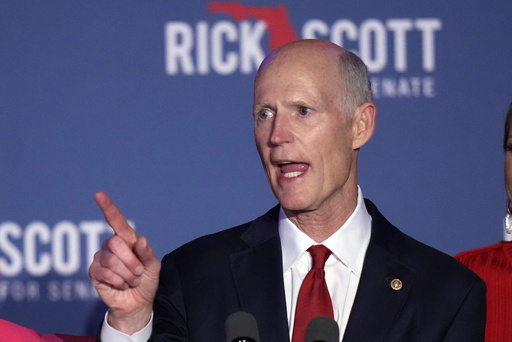
WASHINGTON — Republican senators are set to meet in a private session on Wednesday to determine who will take over as the new Senate leader, succeeding Mitch McConnell after his long tenure in the role. This decision holds significant implications for the future of the Senate and the Republican Party, especially as Donald Trump seeks to reassert his influence following his recent election victory.
Senators John Thune from South Dakota, John Cornyn from Texas, and Rick Scott from Florida are currently vying for support in the upcoming secret ballot election. Each candidate is positioning themselves for a shift in direction within the Senate while simultaneously vying for Trump’s backing, making this a crucial moment in the dynamic between the former president and Congress. This election presents the first major test of Trump’s relationship with Republican lawmakers since his decisive victory.
The outcome remains unpredictable, as Thune and Cornyn have largely focused their campaigns within the Senate, securing private support from fellow senators and raising substantial funds for Republican candidates. Both senators swiftly mobilized after McConnell’s decision to step away from leadership roles, highlighting their readiness to take the helm.
On the other hand, Scott has adopted a more outspoken approach, portraying himself as the candidate most closely aligned with Trump and has received endorsements and support from high-profile figures connected to the former president, including Elon Musk. This has energized his campaign, particularly over the past weekend when his bid gained traction on social media.
The choice made by the senators and any potential last-minute endorsements from Trump could significantly influence the legislative landscape during Trump’s anticipated second term. Historically, Trump had a challenging relationship with McConnell during his first term, often expressing frustration over legislative issues and the Senate’s resistance to his agenda.
In recent months, both Cornyn and Thune have moved closer to Trump, despite previously criticizing him during his 2020 election challenges. While these seasoned senators are seen as institutionalists, Scott has sought to galvanize support for a more transformative leadership approach within the Senate, emphasizing changes aligned with Trump’s vision.
Senator Tommy Tuberville of Alabama, who supports Scott, noted that the recent election results reflect a desire for change among the party base, suggesting that Trump should have more flexibility than he did previously. Tuberville expressed that it’s essential for Trump to feel satisfied with the chosen leader, indicating that he wants to ensure the incoming president has the support he needs.
Regardless of who emerges victorious, all three candidates have communicated their willingness to follow the leadership of Trump as the party’s de facto head, suggesting a readiness to yield some of the Senate’s traditional powers in doing so. Notably, when Trump suggested on social media that the new leader should allow him to appoint Cabinet members during Senate recesses, each candidate indicated an openness to that idea.
The election process is set to take place in a ceremonial chamber in the Capitol, where senators will hear from each contender and cast votes privately, with a majority required to win. The absence of a clear frontrunner further complicates predictions, as the secrecy of the ballot means senators will not disclose their choices, if they choose to share this information at all.
Senator Mike Rounds from South Dakota, who has publicly backed Thune, remarked on the importance of senators choosing a leader whom they believe they can work with effectively over the next couple of years. He noted that he appreciates Thune and Cornyn’s one-on-one approach while still acknowledging that he has spoken with Scott.
One unanimous point among the candidates is the desire for a break from McConnell’s leadership style, which many in the far-right faction of the Senate have criticized, particularly regarding aid to Ukraine and his occasional disagreements with Trump. Thune, Scott, and Cornyn have all indicated that they aspire to provide more opportunities for members to introduce legislation and amendments, as well as to enhance communication within the party.
While Thune, who has served as McConnell’s second-in-command, has been viewed as a leading candidate due to his longstanding relationships in the Senate, Cornyn has also gained significant support from his colleagues, given his previous role as McConnell’s deputy.
Both Thune and Cornyn tend to share similar policy positions, often voting in alignment with their peers but collaborating with Democrats as well. Cornyn’s involvement in bipartisan gun legislation in the past illustrates this willingness to work across party lines. Conversely, Scott has taken a distinct stance against McConnell, framing himself as a challenger to traditional leadership.
As the senators-elect who helped secure the Republican majority next year participate in the election, Scott’s background in business and his alignment with Trump’s agenda are points he has emphasized throughout his campaign. Senator Bernie Moreno, who recently defeated a Democratic opponent, mentioned the “incredible energy” present among the candidates without yet revealing his own choice.
